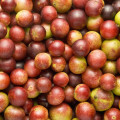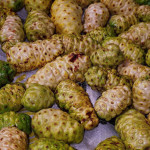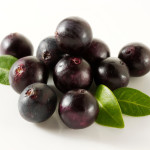 Known as Barbados Cherry, West Indian Cherry – this Acerola (Malpighia Emarginata) is actually a cherry-like fruit is native to South America, Central America, Southern Mexico, and also being grown in Texas and some subtropical region of Asia, like India. Acerola fruit is having a bright red color with several small seeds. Ripe fruits are soft and taste good. The fruit contain 80 percent juice so it may deteriorate rapidly once removed from the tree.
Known as Barbados Cherry, West Indian Cherry – this Acerola (Malpighia Emarginata) is actually a cherry-like fruit is native to South America, Central America, Southern Mexico, and also being grown in Texas and some subtropical region of Asia, like India. Acerola fruit is having a bright red color with several small seeds. Ripe fruits are soft and taste good. The fruit contain 80 percent juice so it may deteriorate rapidly once removed from the tree.
Like Camu Camu, Acerola is known for being extremely rich in vitamin C and it also contains vitamins A, B1, B2, and B3, as well as carotenoids and bioflavonoids, which provide important nutritive value and have antioxidant uses.
Acerola contains from 1 to 4.5 percent vitamin C (1,000 to 4,500 mg in 100 g of fruit) in the edible portion of the fruit – far exceeds the content of vitamin C in oranges (about only 0.05 or 50 mg/100 g of fruit). The content of vitamin C in acerola varies with ripeness (highest in green and lowest in fully ripened fruit). It also varies with the season and climate. Vitamin C analysis regarding acerola storage finds freezing the fruits to be the best way to preserve vitamin C, as compared with room temperature or refrigeration. In addition, acerola contains vitamin A (4,300 to 12,500 IU/100 g) at about the same level as in carrots. Other constituents include thiamine, riboflavin, niacin, calcium, iron, and bioflavonoids. It also contains phosphorus, malic acid, pantothenic acid, potassium, and magnesium. There are also sugars dextrose, fructose, and sucrose. In another analysis report there are protein, fiber, lipids, and fatty acids along with Zinc and other minerals as well found in Acerola.
Vitamin C is an essential coenzyme that is required for normal metabolic function. Many animals can synthesize vitamin C from glucose; however, humans must obtain the vitamin totally from food sources. Deficiencies of vitamin C may result in scurvy, characterized by swollen bleeding gums and the opening of previously healed wounds.
Acerola is also known used for preventing heart disease, atherosclerosis (a condition where the arteries are hardening), blood clots, and cancer. The anti-cancer properties of Acerola extract is further substantiated by some research studies, saying that it can regulate abnormal cell growth at some initial stage of the cancer.
Some people use Acerola to treat the common cold, pressure sores, bleeding in the eye (retinal hemorrhages), tooth decay, gum infections, depression, hay fever, and collagen disorders.
Vitamin C is known to strengthen the immune system and also build collagen cells. It also supports the respiratory system. Vitamin C is known to be an effective antioxidant. The antioxidative qualities of acerola make it an ideal ingredient in skin care products to fight cellular aging. In another report, acerola extract was shown to enhance the antioxidant activity of soy and alfalfa extracts, acting synergistically. This may be beneficial in coronary artery disease.












